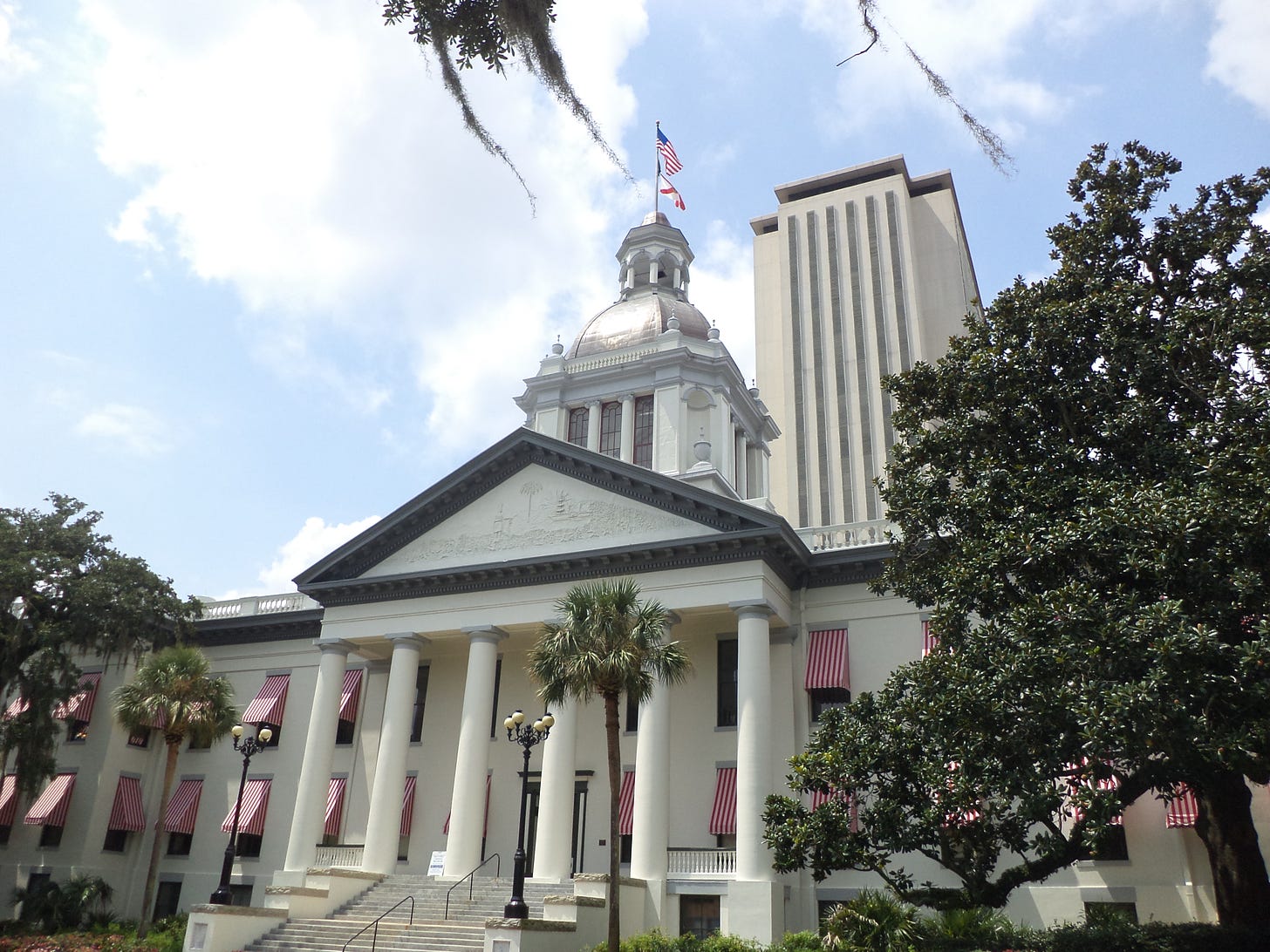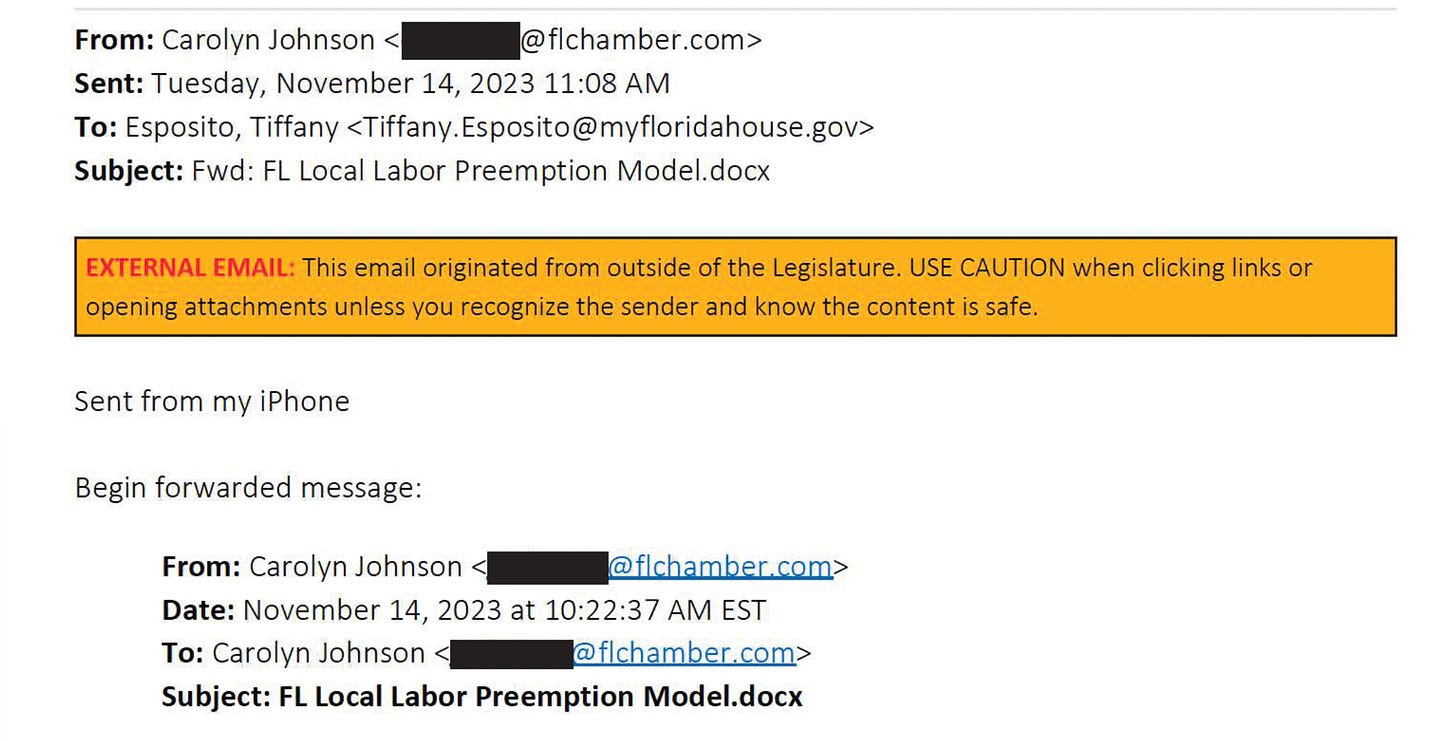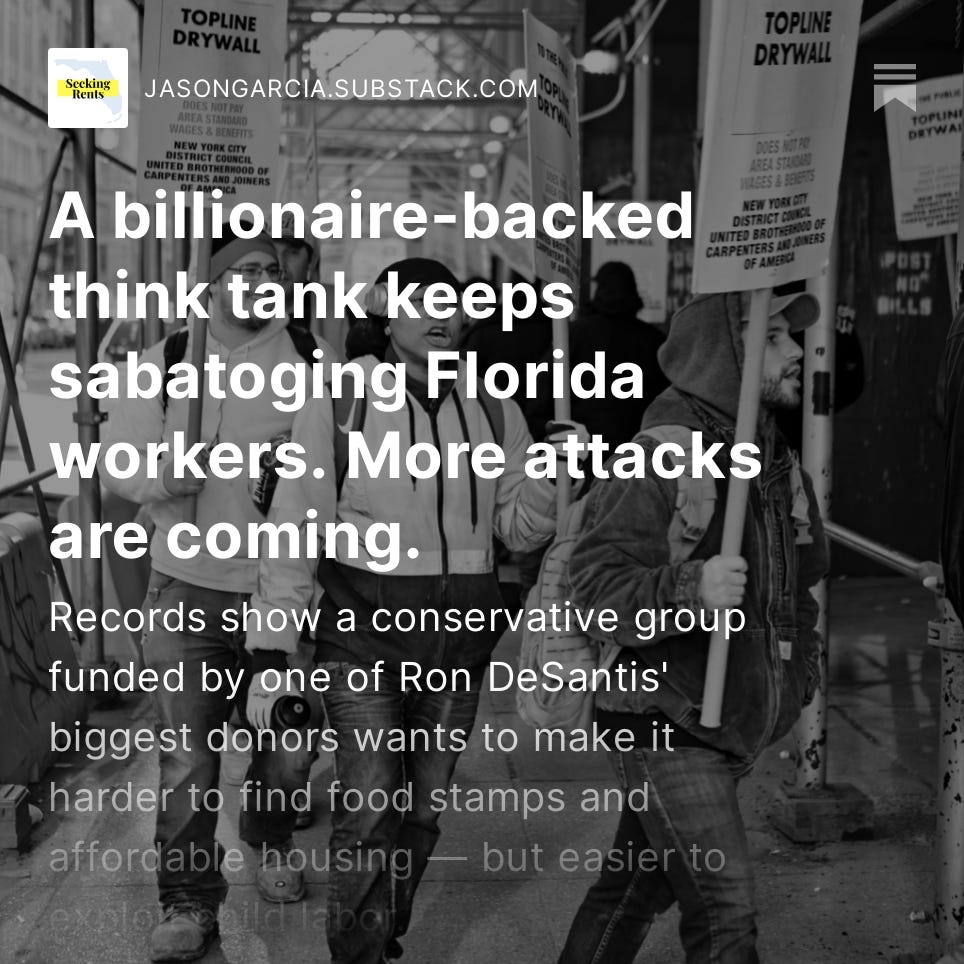Records show a big-business lobbying group wrote a bill to block better wages and benefits for Florida workers
The Florida Chamber of Commerce may have had help from a billionaire-backed think tank that is also trying to weaken Florida's child-labor laws.

This is Seeking Rents, a newsletter and podcast devoted to producing original journalism — and lifting up the journalism of others — that examines the many ways that businesses influence public policy across Florida, written by Jason Garcia. Seeking Rents is free to all. But please consider a voluntary paid subscription, if you can afford one, to help support our work.
A bill in the Florida Legislature meant to stop working Floridians from securing higher pay or better benefits was given to lawmakers by a big-business lobbying group that represents major employers like Publix Super Markets, Bank of America and Walt Disney World, according to emails obtained in a public-records request.
The Florida Chamber of Commerce may not be working alone. The emails suggest the business group had help writing the wages-and-benefits bill from a billionaire-backed think tank called the Foundation for Government Accountability — the same organization that wrote a separate proposal moving through Tallahassee this session that would weaken Florida’s child-labor laws.
The wages-and-benefits bill is House Bill 433. It began as an attempt to stop cities and counties across Florida from passing heat-protection ordinances — local laws that would require employers to provide safety measures like cool drinking water and periodic breaks to roofers, farmworkers and other employees who work outdoors in extreme heat.
But a few weeks after the bill was filed, the Republican-controlled Florida House of Representatives dramatically expanded the scope of the legislation.
In addition to stopping local heat-protection laws, the new version of the bill would also erase “living wage” ordinances that have been adopted in many of Florida’s big cities and urban counties. Those ordinances typically require companies that receive local government contracts to pay their employees a few dollars more than the statewide minimum wage, which is currently $12 an hour.
That’s not all. The revamped legislation would also block cities and counties from doing anything else that might affect the “terms and conditions” of employment at any private employer. It’s a sweeping prohibition that appears partly aimed at stopping the spread of “Fair Work Week” laws, which are meant to ensure more predictable schedules for hourly workers.
Records show this rewrite came from the Florida Chamber. Carolyn Johnson, a lobbyist for the chamber, emailed the proposed legislation to Rep. Tiffany Esposito, a Republican from Fort Myers who is sponsoring HB 433.
Johnson sent the email on Nov. 14. Three weeks later, the House publicly revealed its expanded version of HB 433 — incorporating the Chamber’s language nearly verbatim.
But the Florida Chamber may not have written the bill itself. Metadata on the Word document that Johnson sent to Esposito identify the author as Chase Martin, a visiting fellow at the Naples-based Foundation for Government Accountability, where he “manages the drafting and review of model legislation,” according to the FGA’s website.
Martin also shows up as the author in documents related to House Bill 49, a bill that would roll back key child-labor laws and allow businesses to make some high school students work full-time schedules during the school year. Records show that legislation came directly from the FGA. (Though that bill has also received lobbying support from big businesses.)
The Florida Chamber of Commerce declined to discuss its work with the FGA on HB 433 or say whether it has worked with the controversial organization on any other bills.
“Model legislation that protects Floridians and Florida’s economy is always a good place to start a conversation— it always has been and always will be,” the Chamber said in a written statement. “The Florida Chamber of Commerce has no further comment on this matter.”
Representatives for the Foundation for Government Accountability did not respond to requests for comment.
At a minimum, if HB 433 were to pass, wages would fall for some number of the tens of thousands of Floridians working at companies that hold public contracts in communities that have passed living wage laws — including Alachua, Broward, Miami-Dade and Palm Beach counties and the cities of Gainesville, Miami Beach, Orlando, St. Petersburg and West Palm Beach, among others.
But it would have subtler impacts, too.
For instance, in lobbying materials sent to the state House, the Florida Chamber identified a proposed contract in Orange County that would have required garbage-hauling giant Waste Management to provide more health insurance to employees working for the company under that contract — including paying 80 percent of their premiums and capping deductibles at $400 a year.
A company like Waste Management could ignore such contract provisions entirely under HB 433.
Lawmakers supporting the bill don’t seem terribly concerned about the potential impact on workers. “Could wages go down? Maybe,” Esposito said during a recent hearing on HB 433. “It’s up to the prerogative of the employer.”
Republicans then cut off all public testimony on the bill.
House Bill 433 has already passed one committee in the state House. The Senate version of the bill — Senate Bill 1492 — is expected to clear its first hurdle on Tuesday, during a 1 p.m. meeting of the Senate Commerce and Tourism Committee.
Eroding labor protections for workers has been a long-term project for the Florida Chamber of Commerce and its members, who include many of the biggest companies doing business in the state.
For instance, tax records show that the chamber’s board of directors include executives from Publix, Bank of America, Walt Disney World and Darden Restaurants, the parent company of Olive Garden and Longhorn Steakhouse. The top funders of its political operations include Florida Blue and the sugar producers Florida Crystals and U.S. Sugar Corp. And other significant sponsors include Florida Power & Light, Lockheed Martin, Comcast, Verizon, and mining-and-fertilizer firm Mosaic.
Backed by those corporate giants, the Florida Chamber is also one of the biggest campaign contributors in all of Florida politics. Since the end of last year’s session, campaign-finance records show that the chamber has donated more than $1.3 million to members of the Florida Legislature through a network of political committees. Almost all of that money went to Republicans, who command supermajorities in both the state House and Senate.
The biggest individual recipients of the chamber’s cash include Sen. Ben Albritton (R-Wauchula), who will soon become president of the state Senate and who has taken at least $300,000 from the chamber since the end of last year’s session. They also include Sen. Jim Boyd (R-Bradenton), who is the Legislature’s point person on property insurance legislation and has taken at least $205,000 from the chamber.
And they include House Speaker Paul Renner (R-Palm Coast), who has taken $85,000 from the chamber since the end of last year’s session. That includes a $50,000 check that was cashed on Jan. 8 — one day before the start of this year’s session and three days before HB 433 cleared its first House committee.







You have gotta be kidding me. Keep voting Republican folks, the 1% loves y’all poor & stupid
Florida Republicans make it clear: Profit is stolen labor.